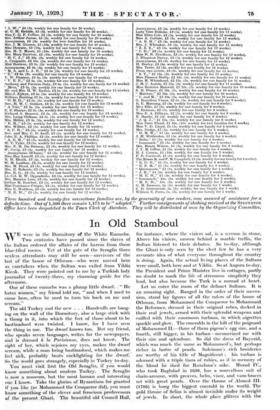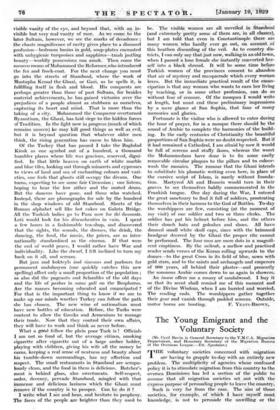In Old Stamboul wg were in th e Dorinitory of the
White. Eunuchs. Two centuries have passed since the slaves of the Sultan ordered the affairs of the harem from these blue7tiled rooms. Yet at the gate of the SeragliO three sexless., attendants may still be seen-survivors of the list. of the houie of Othman-who were moved . here as caretakers When. the „Sultan was exiled from Yildit Kiosk. They were pohited Out to me by a Turkish lady journalist oftweiitY-three, my charming guide for. the afternoon. • One of -these eunuchs was a plump little dwarf. " He hatei women," my friend told me, " and when. I used to come here, often he used to turn his back on _me and scream." the old Turkey and the new . . . Handcuffs are hang- ing on the wall of the Dormitory, also a large stick with a thong in it, into which the feet of those-about to be bastinadoed were twisted. I know, for I have seen the thing in use. The dwarf knows too. But my friend, who speaks seven languages, writes for the newspapers, and is dressed a la Parisiemze, clocs not know. The sight of her, which rejoices. my eyes,, makes the dwarf scream,. while a .man being bastinadoed, which makes me, feel sick, Probably beats' cockfighting for. the dwarf. So the world goes strangely, especially in Turkey to-day.. You must. visit first the Old Seraglio,: if you would know something about modern Turkey. The Seraglio is now a museum, but .the most human and interesting one I know. Take the glories of Byzantinin.for granted if you like (as Mohammed the Conqueror did), you must know something of the clever and ferocious- predecessors of the present .Ghizi, The beautiful old Council go; for instance, where the viziers sat, is a sermon in stone, Above his viziers, unseen, behind a marble trellis, the Sultan listened to their debates. So to-day, although the Ghazi is only seen by the elect few he has a very Accurate idea of what everyone throughout the country is doing. Again, the actual living places of the. Sultans were small, both here and at Yildiz. So at Angora to-day, the President and Prime Minister live in cottages, partly no doubt to mark the life of strenuous simplicity they lead, but also because the Turk is a nomad -at heart. Let us enter the room of the defunct Sultans. It is an amazing sight. Ranged in the order of their succes- sion, stand lay figures of all the rulers of the house of Othman, from Mohariamed the Conqueror to Mohammed the Reformer, dressed in their original robes, decked in their real jewels, armed with their splendid weapons and coiffed with their enormous turbans, in which aigrettes sparkle and glow. The emeralds in the hilt of the poignard of Mohammed IL-three of them pigeon's egg size, and a fourth, still bigger, in his turban-mesmerized me with their size' and splendour. So aid the dress of Bayezid, Which was much the same as Mohammed's, but perhaps richer in lustre of pearls. Suleiman's . rich broideries are worthy of his title of Magnificent : his turban is adorned with a triple tiara of rubies, as if in-memory of the blood 'he shed for Roxelanaii_ sake. Murad IV., who took Baghdad in 1638, has a -marvellous suit of chain-armour, - with greaves, helm, visor, and vain-braces set with great pearls. :Over the throne of Ahmed. III. (1708) is hung the biggest emerald in the world. The gold tivone -Of Selim is almost invisible under its weight of jewels. In short, the whole place glitters with the visible vanity of the eye, and beyond that, with an, in- visible but very real vanity of race. As we come to the later Sultans, however, we see the marks of decadence ; the chaste magnificence of rarity giyes place to a diseased profusion—bedroom basins in gold, soup-plates encrusted with unhygienic turquoises and sapphires—trash jostling beauty—worldly possessions run amok. Then come the rococco rooms of Mohammed the Reformer,who introduced the fez and frock-coat. For the next change you must go into the streets of Stamboul, where the work of Mustapha Kemal the Ghazi, or Gazi, as he spells it, is fulfilling itself in flesh and blood. His conquests are perhaps greater than those of past Sultans, for besides material achievements, he has gained victories over the prejudices of a people almost as stubborn as ourselves, capturing its heart and mind. That is more than the taking of a city. Mohammed the Conqueror overturned Byzantium, the Ghazi, has -laid siege to the hidden forces of Tradition. In the fight now in progress (much of which remains unseen) ire may kill good things as well as, evil, but it is beyond question that whatever older men think, the rising generation has cause_ to bless him.
Of the Turkey that has passed I take the Baghdad Kiosk as one -symbol out of a hundred, a thousand humbler places where life_ was gracious, reserved, digni- fied. In that little heaven on earth of white marble and blue tiles, looking out through minarets and cypresses to views of land and sea of enchanting colours and vari- eties, one feels that ghosts still occupy the divans. One turns, expecting to see some fair Circassian ; one listens, hoping to hear the low zither and the muted drum. But the dancers have gone, and those who watched: Instead, there are phonographs for sale by the hundred in the shop windows of old Stamboul. Sheets. of the Roman alphabet sell like hot cakes on Galata Bridge. All the Turkish ladies go to Para now for the dansants. Loti would look for, his desenchantees in vain. I spent a few hours in a fashionable tea-shop, and discovered that the sights, the sounds, the dresses, the drink, the dancing, the food, the music, the prices, are as inter- nationally standardized as the cinema. If that were the end of world peace, I would rather have War and individuality. Like the dwarf, I felt inclined to turn my back on it all, and scream.
But jazz and kokteyls and sinemas and parlours for permanent ondulasyon (one quickly catches this new Spelling) affect only a small proportion of the population ; as also did the pageants and Selamliks of the old days and the life of pashas in some yali on the Bosphorus. Are the masses becoming educated and emancipated ? For that is the important thing to know if we are to make up our minds wnether Turkey can follow the path she has chosen. The new -wine, of nationalism must have new bottles of education. Before, the Turks were content to allow the Greeks and Armenians to manage their trade. Now that they control their own affairs, they will have to work and think as never before.
What a good fellow the plain poor Turk is ! Officials I am not. so fond of, but the average citizen, smoking cigarette after cigarette out of a large amber holder, playing with children, giving his wife all the money he earns, keeping a real sense of neatness and beauty about his tumble-down surroundings, has my affection and respect. The small restaurants in Stamboul are scrupu- lously clean, and the food in them is delicious. Butcher's meat is behind glass, also sweetmeats. Self-respect, order, decency, pervade Stamboul, mingled with that immense and delicious laziness which the Ghazi must remove if the country to. prosper. Can he do it I write what I see and hear, and hesitate to prOphesy. The faces of the people are brighter than they used to be The visible women are all unveiled in Stamboul (and extremely pretty some of them are, in all classes), but I am told that even in Constantinople there are many women who hardly ever go out, on account of this heathen discarding of the veil. As to country dis- tricts, I can only say that just now, walking in an old town, when I passed a lone female she instantly converted her- self into a black shroud. It will be some time before Turkish women of the provinces consent to abandon that air of mystery and masquerade which every woman loves. But the immediate practical result of the eman- cipation is that any woman who wants to earn her living by teaching, or in some other profession, can do so without fear of censure. Of the mosques I would write at length, but must end these preliminary impressions by a mere glance at San Sophia, that fane of many memories and .glories.
Fortunate is the visitor who is allowed to enter during the hour of prayer, for in a mosque there, should be the sound of Arabic to complete the harmonies of the build- ing. In the early centuries of Christianity the beautiful proportions of San .Sophia were no doubt respected. But if it had remained a Cathedral, I am afraid by now it would be full of .screens and stuffy ikons, whereas the worst the Mohammedans have done is to fix some easily removable circular plaques to the pillars and to, colour- wash the mosaics. : The rumour that the Ghazi intends to substitute his phonetic writing even here, in place of the cursive script of Islam, is, surely without founda- tion. Martyred Ali and Hussein would turn in their graves to see themselves baldly commemorated in the Frankish tongue. ,One day, during the War, I entered the great sanctuary to find it full of soldiers, prostrating themselves in their harness to the God of Battles. To-day the worshippers are few, consisting (at the moment of my visit), of one soldier and two or three clerks.. The soldier has put his helmet before him, and the, others their slouch hats and goloshes and shoes. All have donned small white skull caps, since with the brimmed headgear decreed by the Ghazi the proper rite cannot be performed. The four men are mere dots in a' magnifi- cent emptiness. By the mihrab, a mellow and practised reader sends verses of the Koran rolling upwards to the domes tothe great Cross in its field of blue, sown with gold stars, and to the saints and archangels and emperors of 900 years, all behind their plaster—and presently the sonorous Arabic comes down to us again in showers: An imam offers me a rosary of sandalwood. I buy it so ,that its scent shall remind me of this moment and of the Divine Wisdom, when I am hurried and worried: The reading ends. The worshippers gather together their gear and vanish through padded screens. Outside,







































 Previous page
Previous page